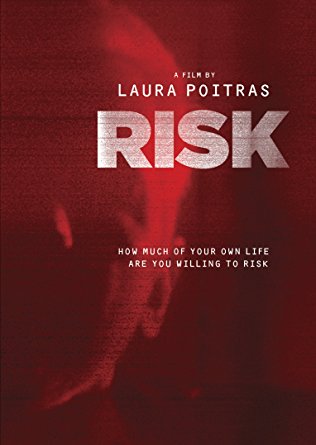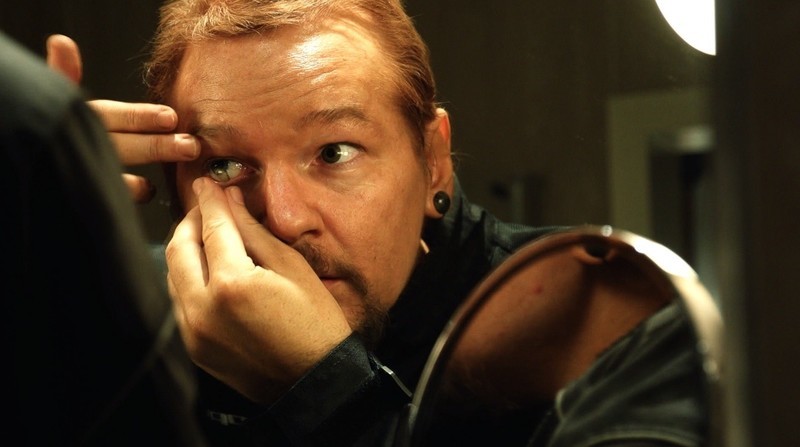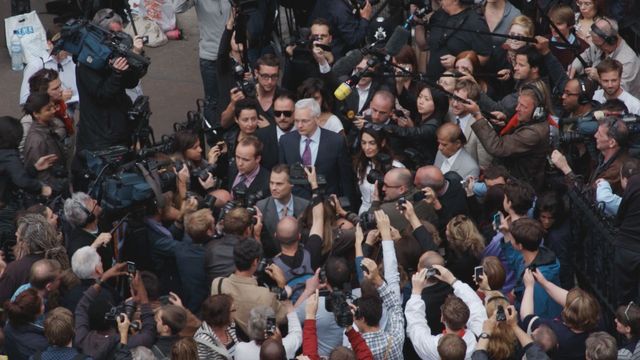Doc Corner: Laura Poitras' Risky Business
 Tuesday, October 3, 2017 at 12:15PM
Tuesday, October 3, 2017 at 12:15PM By Glenn Dunks
 There is a knack to watching Laura Poitras’ latest film, Risk, her first as a director since winning the Academy Award for Citizenfour. And it’s not being abreast of the life and controversies of its on-screen subject, Julian Assange. Although that certainly helps to a point, his journey felt to be of little consequence to me in regards to how I ultimately felt about the movie. The film is messy and often perplexing, no better personified by an utterly surreal and bizarre sequence with Lady Gaga that is not kind to either of its participants.
There is a knack to watching Laura Poitras’ latest film, Risk, her first as a director since winning the Academy Award for Citizenfour. And it’s not being abreast of the life and controversies of its on-screen subject, Julian Assange. Although that certainly helps to a point, his journey felt to be of little consequence to me in regards to how I ultimately felt about the movie. The film is messy and often perplexing, no better personified by an utterly surreal and bizarre sequence with Lady Gaga that is not kind to either of its participants.
Rather, the key to Risk’s success is to not view the film as about Assange at all, but rather Poitras herself. Sure, the WikiLeaks co-founder is front and centre in the film, and documenting him was the modus operandi, but as a documentary subject he’s often far less interesting than the people that orbit him. I am not unaware that I am cutting Poitras an awful lot of slack here...
It’s obvious before even its first scene that this is a compromised film for a liberal filmmaker to be pursuing and this internal struggle is obvious throughout. It’s also what makes the finished product entirely fascinating.
Risk is split into what is essentially two very distinct halves. The first begins in 2010 when Poitras chooses to shadow the then predominantly underground figure of Julian Assange who had suddenly come to global prominence for the leaking of classified material obtained by Chelsea Manning. With the aid of WikiLeaks staffer Sarah Harrison, he becomes celebrated and disgraced in equal measure. When Risk premiered at the 2016 Cannes Film Festival, it was apparently far more sympathetic. But here is where Risk diverts from not just the norm for documentary, but swiftly swerves from what is considered documentarian 101.

A series of personal conflicts with Assange and Jacob Applebaum, a WikiLeaks supporter who Poitras also dated, resulted in a blatant conflict of interest for Poitras. She remodelled the film to be more critical of Assange, questioning his conduct as he holed himself up in the Ecuador consulate of England under threat of extradition to Sweden on sexual assault charges. Risk’s second half is more introspective as she attempts to navigate through her own film the challenging dichotomy of making a film about Julian Assange. His involvement in the election of Donald Trump to the US Presidency seemingly the final nail in the coffin of what was once supposed to be a glowing tribute (well, at least of sorts) to him. She states in voice-over, her voice flat and monotone yet no less steeped in disappointment (as a filmmaker and a human being it would appear), that she hoped she could “ignore the contradictions” and that “this is not the film [she] thought [she] was going to make.”
Poitras has spent the years since winning her Oscar predominantly focusing on producing. Her name is attached to the likes of Strong Island, Nobody Speak: Trials of the Free Press and the "visual journalism" outlet Field of Vision, which has offered up some great documentary short films, particularly by women filmmakers like Adele Free Pham’s State of Oregon and Nadia Hallgren’s Gavin Grimm Vs. Citizenfour is actually an important part of Risk’s narrative – it was during the production of this film that she received encrypted contacts from somebody who would later be identified as Edward Snowden.
This break in Risk is importantly stylistically almost as much as it is dramatically. A marked shift can be seen in her eye as a filmmaker. Music and sound play a vital part in ratcheting up the tension, the images her camera captures and the way they are constructed begin to have greater purpose and stronger impact. The sombre final act, the final kick in a film that makes it even harder to support Assange no matter how much one might agree with his political actions.

In many ways, Poitras’ film goes against all the rules of a documentary. In many ways, that’s why it works. Those after a traditional Assange documentary may be disappointed, but those after a film about the creative process will surely find something potent in Poitras’ struggles. Whatever the ethics in question, Risk doesn’t so much break them as it does force us to think at least for a moment about how we're all shaped by our biases and how even a filmmaker can be compromised for better or worse.
Release: Currently available to stream on Showtime OnDemand or through the regular online retailers like iTunes and Amazon Instant.
Oscar Chances: Laura Poitras is respected among the doc community and that can go a long way. It's more mixed critical response likely means a nomination will be hard, but Poitras and her subject's infamy could definitely push it into the shortlist.
 Citizenfour,
Citizenfour,  Doc Corner,
Doc Corner,  Laura Poitras,
Laura Poitras,  Review,
Review,  documentaries,
documentaries,  politics
politics 


Reader Comments